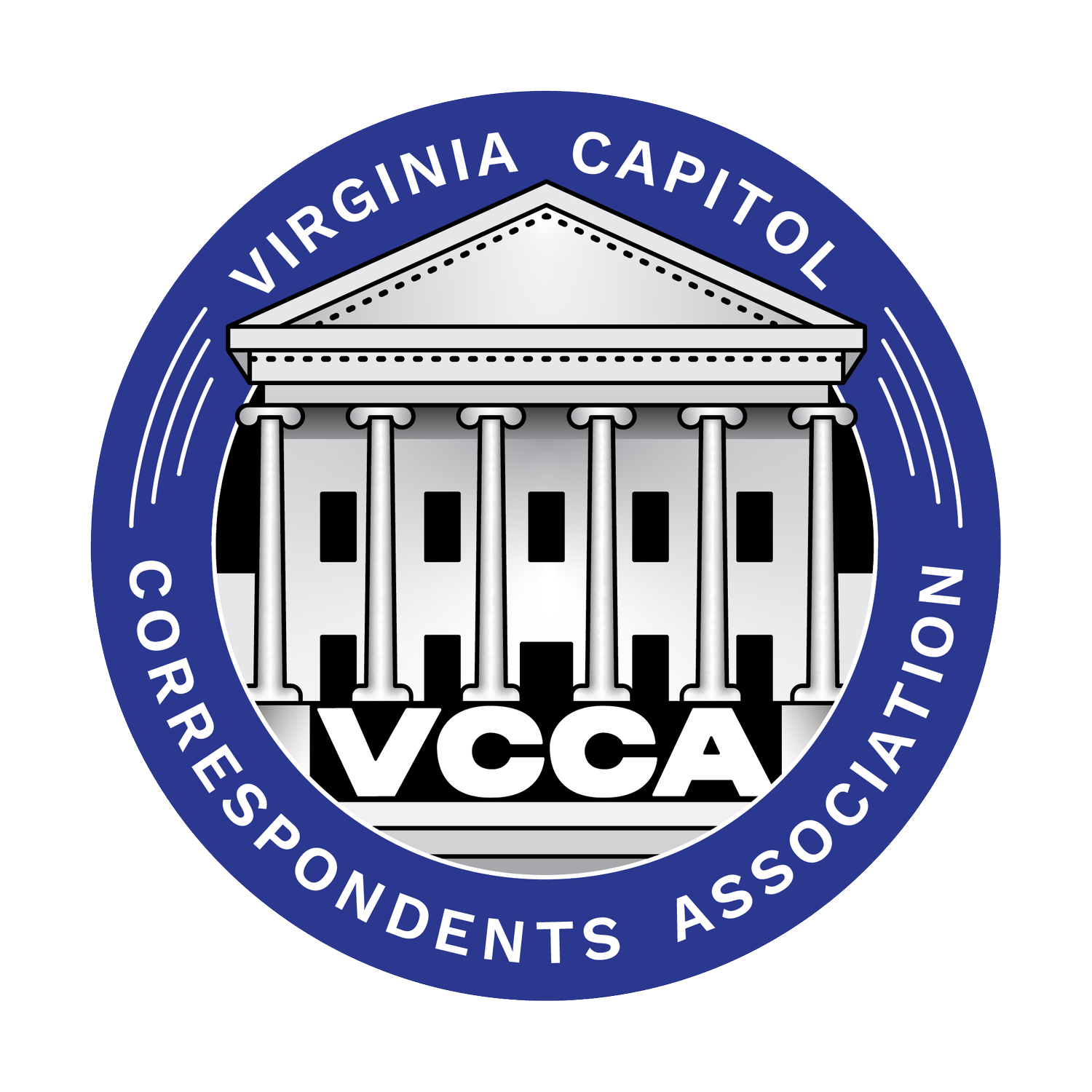
Photo by Markus Schmidt
VCCA Bylaws
Jump to section:
Article I Article II Article III Article IV Article V Article VI
ARTICLE I - Establishment
- Establishment of the Association. The Virginia Capitol Correspondents Association (“Association”) consists of full-time correspondents of bona fide news organizations whose duties consist of covering the Virginia General Assembly. Administration of the Association shall be vested in a Board of Directors. The Board of Directors shall consist of three members of the Association elected annually by the full membership to serve as the Officers of the Association.
ARTICLE II - Purposes
- Purposes of the Association. The Association shall exist and be maintained for the primary purposes of (a) representing the interests of its members in the pursuit of their duties in reporting on the proceedings of state government, (b) advancing the ideals of a free and responsible news media, (c) making recommendations on press credentials to the General Assembly for the purpose of granting media access to the House and Senate floors and the legislative press galleries, and (d) assigning space at pressroom facilities on Capitol Square as they are available.
ARTICLE III - Membership & Dues
- Membership. Membership in the Association is restricted to journalists whose primary responsibility is coverage of Virginia state government and the Virginia General Assembly. Members must be full-time, paid correspondents employed by a news organization that is: (a) a general circulation newspaper that has been published for at least 52 weeks consecutively, (b) a public or commercial radio or television station with regularly scheduled news programming, or (c) a news organization whose principal business is the daily dissemination of original news of interest to a broad segment of the public, and which has broadcast or published (online or in print) continuously for 52 weeks. The news organization must (i) work independently of any government, industry, or institution and (ii) not engage, directly or indirectly, in any lobbying, political activity or other activity intended to influence elections or any matter before the General Assembly or before any independent agency, or any department or other instrumentality of the Executive Branch. Members shall be entitled to vote on matters affecting the Association.
- Obtaining Membership. Membership in the Association shall be determined by the Officers of the Association, in accordance with provisions of these bylaws, and subject to approval of the members. Applicants shall state in writing the names of their employers and their additional sources of earned income.
- Membership Dues. Members shall remit annual dues to the Association to maintain their membership status. The amount of such dues shall be set by the Officers of the Association.
- Use of Credentials. Credentials must be used only in the course of reporting for the credentialed organization. Credentials may not be used to gain access to chamber floors when working for non-news organization clients that were not listed on the member’s application form, or for other purposes unrelated to news coverage.
- Revocation of Membership. Any member of the Association, irrespective of the payment of dues or other qualifications, may be expelled from membership by a majority vote of the membership. Before a vote is taken, formal charges in writing must be filed with the Secretary/Treasurer by three or more members, and the member whose membership is challenged shall be entitled to a full hearing before the Officers of the Association, which will make a recommendation to the full membership. Members may be subjected to the procedure herein outlined only upon charges of violating the bylaws of the Association.
- Freelancers and Interns. Freelancers and interns must apply through a sponsoring publication, broadcast outlet, or Web site that meets the above criteria in Paragraph III.1, by submitting a letter on original letterhead from a supervisor affirming the applicant’s freelance or intern status. Freelancers and interns must abide by all Association rules, including those regarding lobbying, political advocacy, etc.
- Associate Membership. College students who are studying journalism and working at the General Assembly may apply to the Officers of the Association to become Associate Members. Applicants shall state in writing the names of their college or university with their field of study, and submit a letter on original letterhead from a supervising professor. Associate Members shall remit annual dues at a reduced rate to be set by the Officers. Associate Members shall not be entitled to vote on matters affecting the Association. Associate Membership does not include attendance at the annual Association dinner, although a separate payment may be made to attend the dinner.
- Emeritus Membership. Former members of the Association may apply to the Officers of the Association to become Emeritus Members. Emeritus Members shall remit annual dues at a rate to be set by the Officers. Emeritus Members shall not be entitled to vote on matters affecting the Association, nor be granted media access to the House and Senate floors and the legislative press galleries, nor assigned space at pressroom facilities. Emeritus Membership does not include attendance at the annual Association dinner, although a separate payment may be made to attend the dinner.
- Final Say. The General Assembly has the final say on who may enter their respective chambers, notwithstanding any positive or negative recommendation from the Association.
ARTICLE IV - Board of Directors & Officers
- Composition. The Board of Directors shall consist of the Officers of the Association, which are the President, Vice President and Secretary/ Treasurer. To be eligible for election to the Board of Directors, a candidate must be an active member in good standing.
- President. The President shall be the chief executive officer of the Association and shall be primarily responsible for implementing the policies and procedures established by the Board of Directors. The President shall preside at meetings of the Board of Directors and of the general membership, supervise the other officers, agents and employees of the Association, perform such other duties as may be prescribed from time to time by the Board of Directors, and have all other powers and duties that pertain to the position of chief executive officer. The President, or his or her designee, shall serve as the primary spokesperson for the Association, including providing testimony before the General Assembly on matters affecting journalists. The President shall have the authority to issue Association checks and payments, upon approval of the Board of Directors.
- Vice President. The Vice President shall perform duties as needed and prescribed by the President of the Association, including the authority to issue Association checks and payments, which shall be issued only upon approval of the Board of Directors. In case of the death or absence of the President, or of his or her inability from any cause to act, the Vice President shall perform the duties of the President. In the case of the death or absence of the Secretary/Treasurer, or his or her inability from any cause to act, the Vice President may perform the duties of the Secretary/Treasurer.
- Secretary/Treasurer. The Secretary/Treasurer shall be responsible for keeping all of the official records and minutes of the Association and the Board of Directors. Those official records include all documents, reports, and communications connected with the business of the Association. The Secretary/Treasurer shall be responsible for monitoring all Association disbursements as the custodian of the Association funds. The Secretary/Treasurer shall maintain possession of, and have authority to issue, Association checks and payments, which shall be issued only when approved by the Board of Directors. The Secretary shall certify the actions of the Board of Directors when necessary. In the case of the death or absence of the Vice President, or his or her inability from any cause to act, the Secretary/Treasurer may perform the duties of the Vice President.
- Ex Officio Officer. In the case of the death or absence of the Secretary/Treasurer or Vice President, or his or her inability from any cause to act, the Ex Officio Officer may become the Secretary/Treasurer or Vice President and perform the duties of the Secretary/Treasurer or Vice President.
- Election of Officers. The Officers and Ex Officio Officer of the Association shall be elected to one-year terms at the annual membership meeting of the Association. All officers shall serve until the annual membership meeting following their election and until their successors are elected. In the event of concurrent or sequential vacancies in the offices of Secretary/Treasurer or Vice President, the President and Ex Officio Officer shall select a replacement officer from among the Association members for one office. The replacement officer shall then become the Secretary/Treasurer or Vice President and perform the duties of that office.
- Annual Membership Meeting. The annual membership meeting shall be held the day after the midpoint of the General Assembly’s annual legislative session, also known as Crossover.
- Removal of Officers. Any Officer may be removed with cause whenever the membership shall consider that the Officer’s removal will serve the best interests of the Association. Before a vote is taken, formal charges in writing must be filed with the Secretary/Treasurer or other Officer by three or more members, and the Officer who is challenged shall be entitled to a full hearing before the other Officers of the Association, which will make a recommendation to the full membership.
ARTICLE V - Committees
- Standing Committees. The Officers may create Standing Committees as they may deem appropriate and appoint members of the Association to membership on such Standing Committees, and may fix and prescribe their rights, duties, power, authority and terms of office.
- Operating Procedures. The provisions of these bylaws that govern meetings, action without meeting, notice and waiver of notice, shall apply to all Standing Committees and their members. Each committee may establish its own additional rules of procedure not inconsistent with these bylaws.
- Limitations on Authority. No committee may (1) fill vacancies on the Board of Directors or on any of its committees, (2) amend, adopt, or repeal bylaws, (3) approve a plan of merger or consolidation, (4) approve the sale, lease or exchange, or the mortgage, pledge or other disposition, of all or substantially all of the property and assets of the Association, or (5) approve the dissolution of the Association or revoke a voluntary dissolution.
ARTICLE VI - Miscellaneous Provisions
- Fiscal Year. The fiscal year of the Association shall be the calendar year.
- Amendment of Bylaws. The power to alter, amend or repeal the bylaws of the Association or to adopt new bylaws shall be vested exclusively in the Board of Directors.
